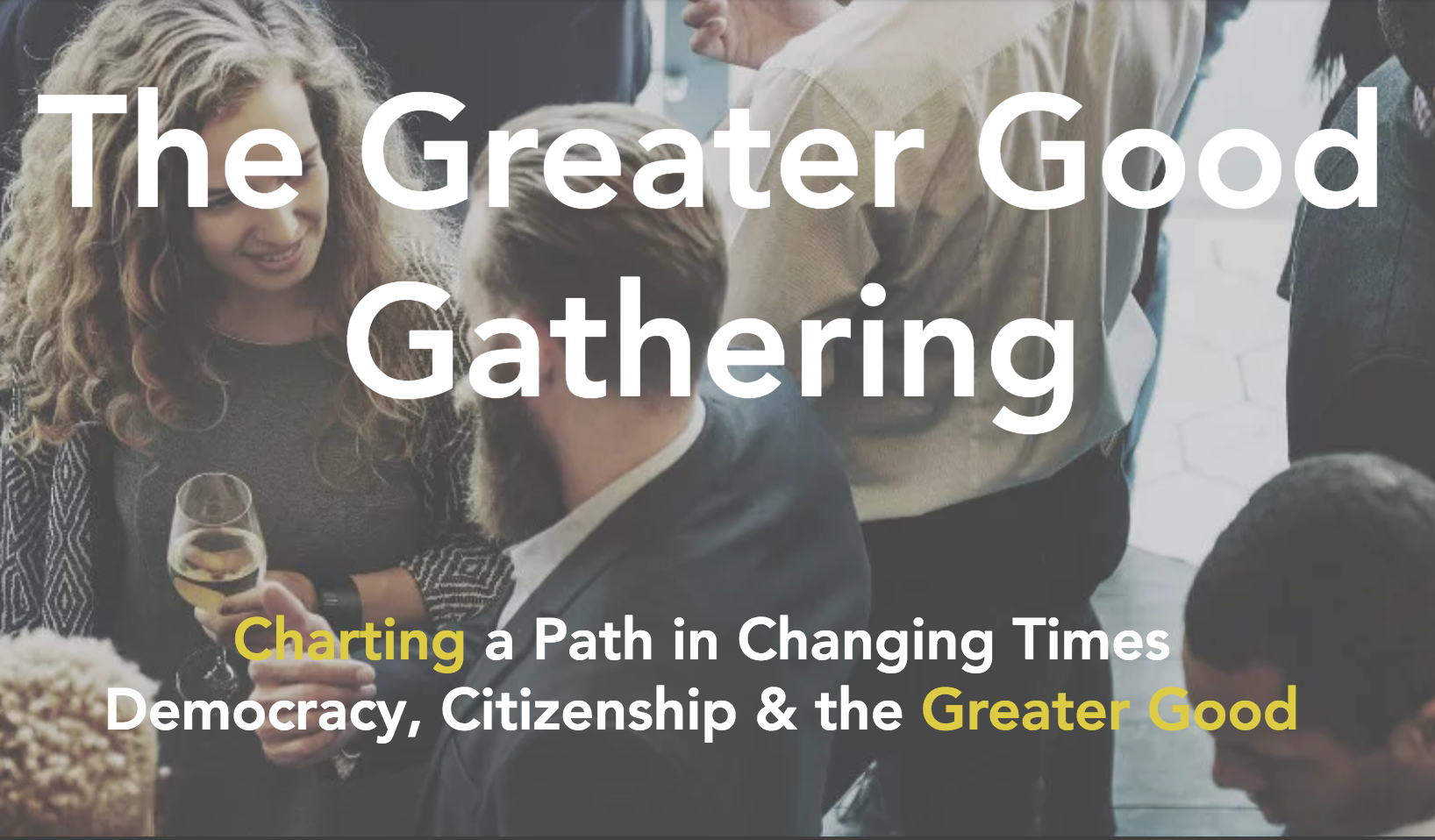Government
Here It Is
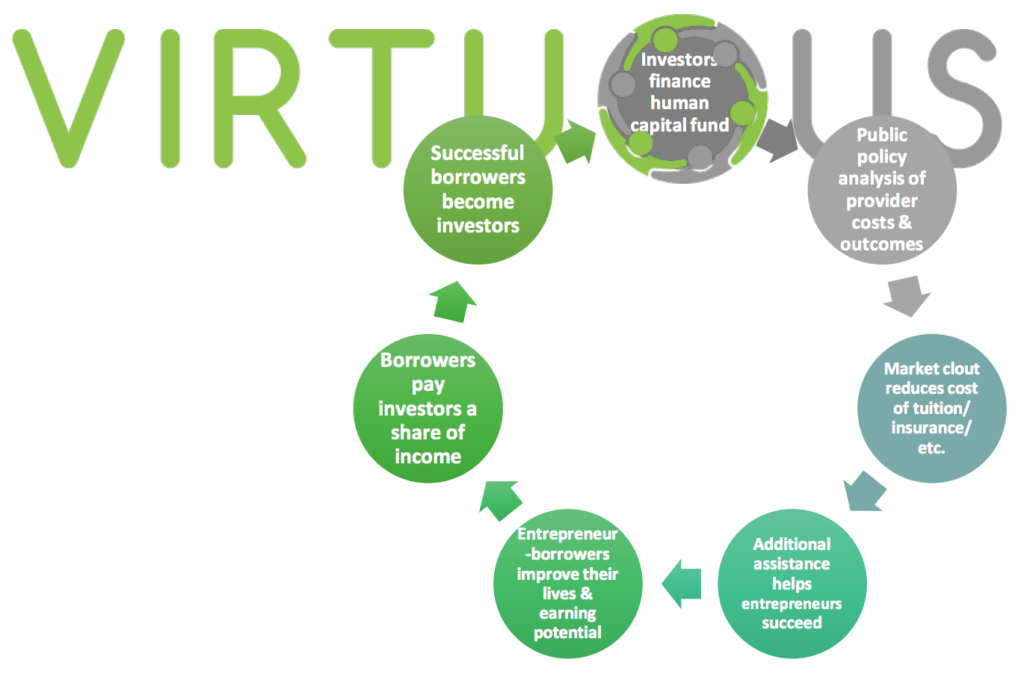 I’ve been promising for several months to give you the details of the idea I’ve been working on the last three years – the business model for what’s going to replace government as we’ve known it for at least the last 2,500 years. Sorry that’s taken me so long … but: Here it is!
I’ve been promising for several months to give you the details of the idea I’ve been working on the last three years – the business model for what’s going to replace government as we’ve known it for at least the last 2,500 years. Sorry that’s taken me so long … but: Here it is!
As I discussed previously, the origins of this idea lay in what I’ve been writing and teaching the last several years about “The Future of Government”: that modern technologies like the Internet, the platform business model, and blockchain, by moving us increasingly into a virtual world where distance, mass and geography matter less and less, are undermining the traditional national state. The question then becomes what replaces nation-states – an issue at the heart of the current worldwide political struggles between globalists and nationalists – and, in particular, What happens to so-called “public goods”?
In economic jargon, “public goods” are non-rivalrous and non-excludable – in other words, my consumption doesn’t deplete the amount available for you, and I can’t “own” it and keep you from using it. Public goods include much that we’ve come to expect governments to provide, such as public safety, public health, social insurance, education – things that create broader benefits for society as a whole, and from which everyone benefits. “Public goods” thus ultimately form the rationale for government itself. What happens to them in a society where technology increasingly allows resources to escape the territorial clutches of governments more easily than ever, and allows us all to opt-out of obligations we don’t want?
 I think they die – unless we can develop a method to capture (or “monetize”) their benefits and share them back to all (and only those) who choose to subsidize them. In other words, we need a profit-making model for public goods. Fortunately, the same technologies weakening nation-states today make possible the formation of voluntary, virtual communities.
I think they die – unless we can develop a method to capture (or “monetize”) their benefits and share them back to all (and only those) who choose to subsidize them. In other words, we need a profit-making model for public goods. Fortunately, the same technologies weakening nation-states today make possible the formation of voluntary, virtual communities.
Investments in “human capital” – education, health care, child development, social insurance – aren’t just liberal, feel-good things: They pay measureable economic “dividends.” For example, the average lifetime earnings of an African-American single mother go up by a half-million dollars if she has five-years of day care for her kids. A child’s lifetime income goes up by $6,000 (in present value) for every year that child has a good, instead of simply a mediocre, classroom teacher. These returns not only pay for the social investment – they’d turn a healthy profit for anyone financing them in place of the government.
Closing the Circle
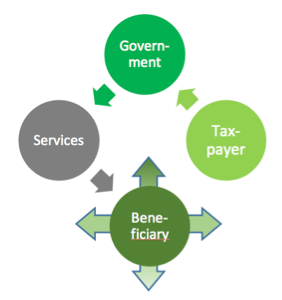
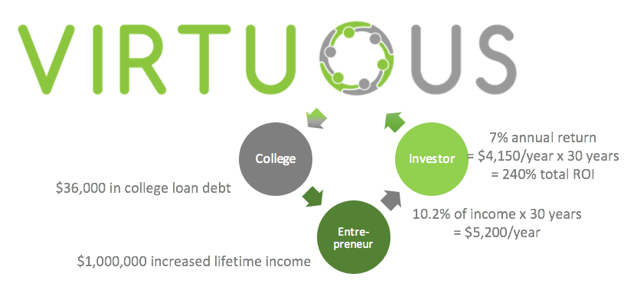
This is easiest to see in the commonly-understood example of return on higher education. Above are two illustrations I frequently use: The way things are today, taxpayers pay for government-provided services that (hopefully) improve people’s lives – but the benefits don’t necessarily accrue observably to the taxpayer. But if we treat beneficiaries as entrepreneurs, in whom we make an investment and then reap a percentage of the “profits,” the increased income alone would pay a healthy rate of return.
Such “income share agreements” already exist in higher ed; my new business, Virtu.us, aims not only to expand their presence but also to bring this concept to financing job training, high-quality child care, various forms of social insurance, and even provision of the kind of K-12 schools every child needs and deserves. All through an easy-to-use app and web portal.
But the concept doesn’t stop there. As the graphic at top illustrates, this model will incorporate policy analysis insights as to “what works” into market assessments of how best to invest in individuals; use the market clout of a growing community-of-interest to drive down the price of these services for everyone; and even expand over time into a wider potential range of “public goods” encompassing, well, virtually all current government activities. Eventually, this becomes a fully-fledged, on-line community – providing the things people want, but decreasingly find today, in real-life communities, let alone the on-line kind.
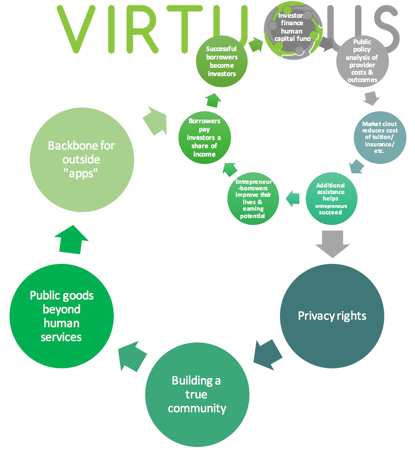 Perhaps you think the idea of private “governments” is terrible. Perhaps it is – but as public institutions as we know them decay, a new alternative will be needed for a very different future. Perhaps you think everything going on today will pass in another two years (or two weeks); perhaps it will – but the economic, political and technological phenomena driving public disinvestment have been going on for the last 40 years, and are occurring today everywhere across the globe. As you know if you’ve been following what I write for the last, oh, decade or so, the need for a new model of public-goods investment – and social progress – isn’t a passing Trump phenomenon: It’s the defining political challenge of our time. Virtu.us is my attempt at an answer.
Perhaps you think the idea of private “governments” is terrible. Perhaps it is – but as public institutions as we know them decay, a new alternative will be needed for a very different future. Perhaps you think everything going on today will pass in another two years (or two weeks); perhaps it will – but the economic, political and technological phenomena driving public disinvestment have been going on for the last 40 years, and are occurring today everywhere across the globe. As you know if you’ve been following what I write for the last, oh, decade or so, the need for a new model of public-goods investment – and social progress – isn’t a passing Trump phenomenon: It’s the defining political challenge of our time. Virtu.us is my attempt at an answer.
If you want to know more, there’s a 60-page white paper online at ericschnurer.com/virtuous: Please read it – I really want your comments and feedback! If you’d like to do more, let me know: We need programmers and project managers, futurists and finance whizzes, analysts and actuaries, marketers and MBAs. One way or another … we need you!
Quick Links:
Also, the last issue left out the link to my recent article about the collapse of the center: http://www.aspeninstitute.it/aspenia-online/article/two-americas-and-lost-center.
Coming next:
An analysis of the 2016 midterms
The role of policy in campaigns
How we helped to strengthen one of the poorest school systems in America
Takeaways from my new course at Brown University on poverty and the future
Again, I welcome your thoughts in the comments below!
The Beginning & The End
 Out in New Mexico recently, I was able to mix kayaking over Class 3 rapids, hiking at Tent Rocks National Monument, and eating at celebrated restaurants, with catching up with old friends – like former Governor Bill Richardson. In between, I spent some time at Santa Fe’s first-class museums.
Out in New Mexico recently, I was able to mix kayaking over Class 3 rapids, hiking at Tent Rocks National Monument, and eating at celebrated restaurants, with catching up with old friends – like former Governor Bill Richardson. In between, I spent some time at Santa Fe’s first-class museums.
One of these, the Museum of Indian Arts & Culture, covered economic and cultural changes over a millennium ago along the Mogollon Rim – a sharp drop-off between high and low deserts that stretches across almost all of Arizona and New Mexico, where I spent a lot of my youth. The original “basket-weaver” culture above the Rim is so-called because it knew no pottery. But eventually, the superior technology of pottery-making filtered its way in from elsewhere. So did the bow, whose superior firepower provided a more convenient means of defense than retreating each night atop the Rim, enabling villages to relocate down the steep escarpment to the valley below, where their crops grew. Here, in an ancient world far different from our own, communities were being uprooted, and perhaps for the unfortunate basket-weavers their source of livelihood destroyed, by “transborder” flows of new technologies and ideas.

Similar historical developments have been on my mind lately. My friends at the European branch of the Aspen Institute recently asked me to write on two seemingly-different subjects – the Trump Administration’s relationship with business, and the future of cities. But understanding where we are today, and where we’re heading, requires seeing these as merely the latest incarnation of tensions going back to the dawn of humanity.
My forthcoming piece for the journal Aspenia, entitled Urbi et Orbi (“To the City and the World,” the Pope’s traditional greeting), takes a roughly 60,000-year tour of the “[t]ension between nomadic, hunter-gatherer, and even pastoralist lifestyles, on the one hand and sedentism,” on the other. With a quick recap of the Cain and Abel story – about which I’ve written before as a parable of economic and political change not unlike today – the piece summarizes the intertwined emergence of both city and state as sources of increased sophistication and change, but also increased inequality and economic exploitation. Noting that “perhaps the most exploitive social and economic relations were always those between cities and the more traditional agricultural communities in their hinterlands,” the piece turns to an extended comparison between the food chains found in the natural world (drawn from my readings for Deep Policy discussed in the last update) and those in human societies:
The tripartite division between producers, transformers and predators described above generated the same dynamic that we see in today’s populism…. There is thus nothing new in today’s global clash between a largely urban, cosmopolitan, socially liberal society based on a transnational New Economy and a largely exurban, place-oriented, traditionalist society rooted in an increasingly-secondary or tertiary extractive economy.
My other recent article, Trump’s traditional Republican economic choices, argues that, despite the initial horror of the business elite and GOP establishment, they have all largely made their peace with Donald Trump – because his policies are really “perfectly consistent with what Republicanism, and to a lesser extent ‘conservatism,’ have long become.” These policies are instead – predictably – squeezing the very voters who supported and continue to support Trump and Republicans. As Urbi et Orbi shows, the same factors have played out historically in every polity since Ancient Greece.
I’m often asked by people on the Left why they should care about these benighted voters. The first answer is that peoples whose cultures and livelihoods (regardless of whether you share them) are threatened by change – whether the advent of pottery or the Internet – are precisely those about whom the Left ought to care.
The second is that, “The tragedy of the moment is that Trump’s opponents are offering very little to those on the short end of the stick from these developments, who are right to be angry – while Trump’s appeal to them is based purely on selfishness, not on what is best for the country as a whole. Unfortunately, the same can be said of the entire thrust of Trumponomics.” The piece concludes:
The symbiosis of government and business into one big rent-seeking enterprise is precisely what principled conservatism has opposed for decades, and criticized in modern liberalism…. Candidate Trump explicitly campaigned against just this – and yet, as both a private individual and as President, Donald Trump literally personifies it. In Trump’s America, more so than ever before, government itself is up for sale. This represents perhaps the logical end-point of the short-term, self-serving ideologies that passed for “conservatism” or “pro-business” in recent decades – but it also has represented the end-point of democratic and capitalist decline throughout history.
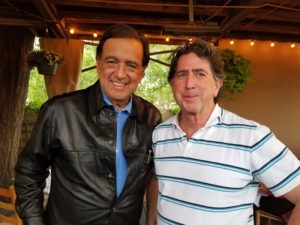
With former New Mexico Governor Bill Richardson
As always, I welcome your comments below.
Hey, You!
 In the weeks since I sent you my last update about the Greater Good Initiative, I’ve heard from, and talked with, many of you about what this initiative could become beyond an annual conference (and we’ve already started planning for the November 2018 installment – more in a future update!). As a result, I’ve made some progress – and now I’m hoping for some further input from you.
In the weeks since I sent you my last update about the Greater Good Initiative, I’ve heard from, and talked with, many of you about what this initiative could become beyond an annual conference (and we’ve already started planning for the November 2018 installment – more in a future update!). As a result, I’ve made some progress – and now I’m hoping for some further input from you.
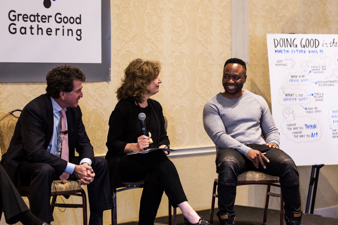
At the most grandiose extreme, some have suggested to me that the Greater Good should be the beginnings of a new political party. While we certainly need political change – on both sides of the aisle – a new party isn’t really viable under our system (and I’m not the guy to start it). The most “successful” third party in the U.S. was the Progressives … who were so successful they went out of business: The two established parties were forced to co-opt the Progressive agenda, which then essentially became the reigning American ideology for the bulk of the 20th Century. In short, we don’t need an alternative party so much as an alternative agenda that can play the same role in the 21st Century. And that does strike me as a good function for the Greater Good Initiative.
 While such an agenda starts with making government work better to redress injustice and unfairness, it also needs to address a broader range of mechanisms for change and social progress. We need to think of “governance” as something that occurs in institutions other than just the nation-state or the public sector, and “politics” as embracing not just governmental but also market and civil-society interactions (a point I made in this prior update).
While such an agenda starts with making government work better to redress injustice and unfairness, it also needs to address a broader range of mechanisms for change and social progress. We need to think of “governance” as something that occurs in institutions other than just the nation-state or the public sector, and “politics” as embracing not just governmental but also market and civil-society interactions (a point I made in this prior update).
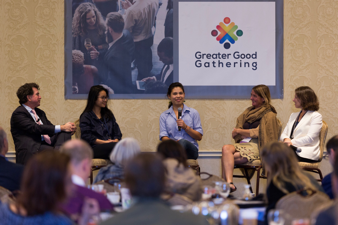 So I want to make sure that the Greater Good Initiative gets beyond simply political discussion and embraces civic and economic entrepreneurship – a key theme of the first Greater Good Gathering. In recent weeks, I’ve talked with several of the young social entrepreneurs who spoke at the conference (if you haven’t yet, you should watch the video highlights of their presentations) about how best to encourage and support people like them developing non-governmental solutions to social problems. Their answer lies – as in so many areas – in supportive networks of people and information. Some of that comes in the form of incubators and co-working spaces – but it also needs to come through non-location-specific networks. We need to incorporate mechanisms for developing, encouraging and supporting social entrepreneurship – the actual doing of social change – to make this initiative a web of individual actions advancing the greater good, not just calls for a government that does so.
So I want to make sure that the Greater Good Initiative gets beyond simply political discussion and embraces civic and economic entrepreneurship – a key theme of the first Greater Good Gathering. In recent weeks, I’ve talked with several of the young social entrepreneurs who spoke at the conference (if you haven’t yet, you should watch the video highlights of their presentations) about how best to encourage and support people like them developing non-governmental solutions to social problems. Their answer lies – as in so many areas – in supportive networks of people and information. Some of that comes in the form of incubators and co-working spaces – but it also needs to come through non-location-specific networks. We need to incorporate mechanisms for developing, encouraging and supporting social entrepreneurship – the actual doing of social change – to make this initiative a web of individual actions advancing the greater good, not just calls for a government that does so.
 Most people in fact have seen in the Greater Good Initiative some sort of “distributed” process, mirroring the way I’ve argued that technologies like blockchain are going to transform society and all power structures. Nevertheless, the literature on the burgeoning phenomenon of “leaderless movements” indicates they peter out without a well-defined agenda – and that agenda has to come from some sort of “elite” or “leadership.” So the challenge is how to create an agenda with expert input and leadership while retaining the essential character of a distributed, grass-roots movement. Rather than an institutionalized “think tank,” this requires a fluid thought process – assembling experts with diverse views to “think differently” and come up with answers that the political system, with its current no-compromise dynamic, won’t entertain.
Most people in fact have seen in the Greater Good Initiative some sort of “distributed” process, mirroring the way I’ve argued that technologies like blockchain are going to transform society and all power structures. Nevertheless, the literature on the burgeoning phenomenon of “leaderless movements” indicates they peter out without a well-defined agenda – and that agenda has to come from some sort of “elite” or “leadership.” So the challenge is how to create an agenda with expert input and leadership while retaining the essential character of a distributed, grass-roots movement. Rather than an institutionalized “think tank,” this requires a fluid thought process – assembling experts with diverse views to “think differently” and come up with answers that the political system, with its current no-compromise dynamic, won’t entertain.
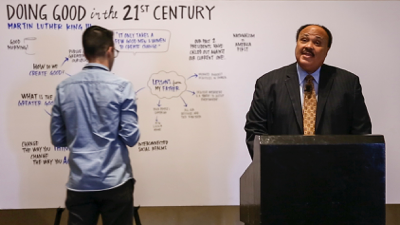 But this also can’t be just an elite-only, centralized process: This must be a process of discussion and dialogue that’s two-way, both vertically and horizontally, in which individuals and groups are free to devise their own agendas and solutions but also out of which broad consensus hopefully emerges – something like a live version of a “wiki” that starts with some sort of thoughtful core but not (like think tanks today) driven by a pre-existing ideological goal.
But this also can’t be just an elite-only, centralized process: This must be a process of discussion and dialogue that’s two-way, both vertically and horizontally, in which individuals and groups are free to devise their own agendas and solutions but also out of which broad consensus hopefully emerges – something like a live version of a “wiki” that starts with some sort of thoughtful core but not (like think tanks today) driven by a pre-existing ideological goal.
Each individual “node” in this network could follow its own model: a local “Greater Good Gathering” organized by folks in Gatlinburg, a monthly meet-up in Minnetonka, a “koffee klatch” in Kalamazoo, a book club in Bethesda, a discussion group in Des Moines, a social enterprise incubator in Inverness, or lone individuals in the Lone Star State, all contributing their concerns and solutions and feeding off the ideas of others in a dispersed national network devoted to building the Greater Good.
 That’s what I’m working on building. How? I don’t know yet – that’s why I’m asking you. After all, that’s what’s gotten the concept this far. Please let me know your thoughts in the comments below or email me at eschnurer@public-works.org.
That’s what I’m working on building. How? I don’t know yet – that’s why I’m asking you. After all, that’s what’s gotten the concept this far. Please let me know your thoughts in the comments below or email me at eschnurer@public-works.org.
Thanks,

“Are You Better Off?”
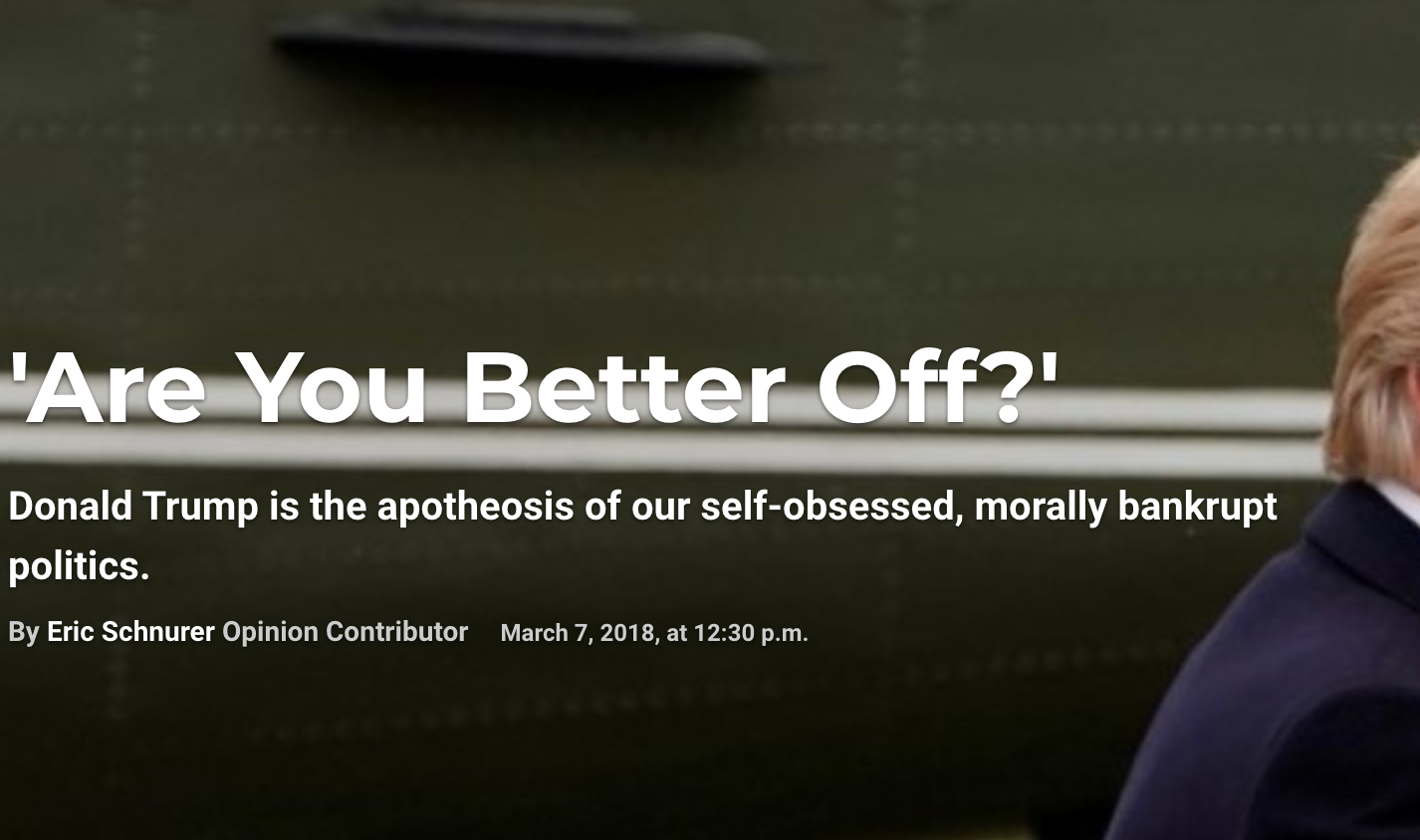 I just wanted to share with you my most recent piece for US News & World Report, which is also, sadly, my last, as they’ve discontinued their Opinion section. Watch for news on my new writing outlets soon.
I just wanted to share with you my most recent piece for US News & World Report, which is also, sadly, my last, as they’ve discontinued their Opinion section. Watch for news on my new writing outlets soon.
PRESIDENT DONALD TRUMP last week launched an international trade war, hung up on Mexico’s president because he wouldn’t agree to pay for Trump’s border wall and announced he favored seizing guns without due process (a position from which he quickly retreated). These issues all have something in common (other than Trump) that goes to the root of what’s wrong in American politics today.
As discussed (here and here) during the 2016 campaign, both trade and immigration constitute a particular type of problem: Each benefits the larger society, raising the standard of living not just of the country as a whole but also of the majority within it. Yet both produce losers; various studies show, for instance, that immigration results in higher earnings for those with already-higher earnings – but lower wages for the lower-skilled.
Such “wedge issues” are used by politicians to drive Americans apart to the advantage of no one but these politicians. They are a means to exploit people’s misfortune by turning it into anger – and then turning that anger into votes. What they are not are exercises in building constructive solutions to problems, through compromise, consensus or common cause. And they are all traceable to the single watershed moment in which Ronald Reagan transformed American politics into the unrelenting exercise in selfishness that it is still today, when he asked Americans to vote on the basis of one question alone: Are you – not the country as a whole, or others, but you – better off today than you were four years ago?

Yes, politics is largely about self-interest, and even the Framers believed that a balance of self-interests, not messianic utopianism, was the central requirement of stable democracy. But the country’s leaders used to call us to a vision – even when the ultimate goal was individual freedom and self-realization – of an America greater than each of us individually. “Ask not what your country can do for you, ask what you can do for your country” died with “Are you better off?”
Trump is the apotheosis of this morally-denuded politics. Has there ever been a human being so clearly interested in nothing but himself? Despite his faux populism, his agenda in office has been a mix of standard-issue tax breaks targeted almost entirely to his fellow plutocrats and banana-republic self-enrichment. Even his conception of “making America great again” is about atomized self-interests, not any notion of an “America” embracing all, or even most, of us, knit together to form a society: A “greater good” beyond individual grievance? Global leadership? Moral values? As Robert D. Kaplan recent wrote in The National Interest (by no means a liberal publication), “[Trump] has also, with his calls for protectionism and a narrowly defined American self-interest, voided American foreign policy of any real, uplifting purpose – another sure sign of decline.” We are, in short, a country losing its way morally, one wallowing wholly in self-interest.
Whatever Trumpism’s underlying themes of racial, sexual and economic resentments, Trump has chosen trade, immigration and the demise of extractive industries as his chisels to break apart American society precisely because, while these have generated tremendous gains for the U.S. as a whole, they produce a subset who pay the price for the overall advance. Morality – as well as a practical regard for political reality and social peace – suggests that some of the gains of progress be redistributed to its victims; this might, in fact, be regarded as the core of “progressivism.” But as Democrats have become the “Party of the Ascendant,” those left behind by the world economy – largely older, white, religious, conservative males with lower levels of education living in rural or exurban areas – don’t seem all that appealing, or deserving of solicitousness, to “progressives” nowadays. In lieu of adequate solutions, Trumpism has been left to exploit the resulting unfairness and resentment to tear down both broader progress and all social cohesion.
This is exemplified in the current polarization over guns, as well, a point brought home by a Douglas High School student, Emma Gonzalez. Toward the end of her fiery speech with its refrain, “We call B.S.,” Gonzalez observed that the position of gun advocates appears to be that their rights to own guns outweigh children’s right to live. This has been a recurrent liberal argument since the Parkland shootings – but liberals ought to be wary of assertions that all rights must be balanced against other concerns: The rights to a fair trial, or against cruel and unusual punishment, or to free speech simply are not outweighed by governmental exigency or others’ sensitivities. Nonetheless, as I wrote after these shootings, most of us recognize and voluntarily concede non-governmental restraints on our rights in order to live in, and help produce, a functioning society with others. It’s called decency.
What’s striking about the gun debate today is the absolute unwillingness to seek the kinds of compromise necessary to a society, as opposed to an unwilling collection of individuals. We are no longer interested in anyone else’s perspective or anyone else’s rights. As Gonzalez summed up the situation, dismissively, “Mine! Mine! Mine! Mine!”
This phenomenon isn’t helped by Trump’s suddenly announcing that, as on so many other issues, the answer is to empower his own id and worry about constitutional rights later, if at all. We actually don’t need a Great Leader who believes that He Alone can solve our problems as a society – although that is an appealing solution to a growing, and scary, number of Americans. Rather, we need a society willing to solve its problems as a society.
It’s increasingly clear that we no longer live in such a world. We increasingly live, rather, in neighborhoods where no one disagrees, read news that doesn’t challenge our views, select our own definition of truth like we do our own music, and never have to adjust our preferences to those of anyone else. Neither politics, governments nor countries as we know them will last in such an environment. The question is whether such concepts as common good, or compromise, will.
You Can Do Anything

The other night, just after finishing my piece that ran yesterday on what we can do about gun violence, I received an email from a student at Princeton University, where I’d given a talk two weeks ago. It began;
“Thanks so much for coming to Princeton, firstly! The discussion with you is one of the best events I’ve ever been to at Princeton – you felt really accessible, personable, and I, at least, felt like I could do anything afterwards.”
That’s probably the first time anyone found me particularly “accessible” or “personable.” But what I talked about at Princeton was the work I’m doing outside my consulting to respond to the changes I see in the world today through the “Greater Good” initiative I’ve discussed here a bit, and my related efforts to launch a “government business.” Unlike most people I know, who think we’ve descended into a second Dark Age, I believe we’re entering a Golden Age for the ability of us all individually to – in Gandhi’s phrase – be the change you want to see in the world. That’s why this student – and the others who hung around afterwards to talk with me about career pursuits – rightly took from my remarks the feeling that he “could do anything.”
My piece yesterday in US News (which was also picked up by MSNBC) in reaction to the Parkland shooting discusses the same phenomenon behind my optimism about our ability to act – if at the same time, indeed because of, my declining belief in traditional politics as the best route for doing so. In People, Not Politicians, Can Solve America’s Gun Problem, I note that, “not surprisingly, mere days after the massacre at their school, students from Parkland watched from the gallery as their state legislature voted down holding any debate whatsoever on assault weapons this year. There almost certainly will be no meaningful government action against gun violence.”
I’ve used my US News platform to argue for several years now that “governments everywhere are growing in impotence due to a host of tectonic global shifts,” and, to me, what’s happening now over guns proves the point: A minority of Americans representing a return to extractive economics and politics now holds virtually unchallenged political power in the US – and increasingly around the world – yet the majority, who live in a very different world economically and ideologically, are rising up to wrest power from them on this issue, led by the least powerful of all: children. My argument is that this effort will continue to fail politically – but that is irrelevant. It will succeed through non-governmental means – and I give numerous examples: consumer boycotts, disinvestment campaigns, voluntary home interventions, public shaming, moral opprobrium, information and education, even (God forbid!) research. “A previous generation of young Americans ended a war and ushered in an era of greater tolerance by changing society more than by changing politicians. That’s where attention needs to be focused.”
This ties into the Greater Good, the “government business,” and a new series I’m writing for a national publication on what “progressivism” or “liberalism” need to mean in the 21st Century. New technologies are making it increasingly difficult for centralized authorities to assert and maintain their dominance – reducing marginal costs, lowering barriers to entry, making it easier for individuals to act on their own, and virtualizing virtually everything. These same technologies also make it quicker and easier to aggregate individuals, metricize and monetize virtually everything, keep free-riders out and enforce commitments amongst those who opt in. This isn’t eliminating all “authority,” but it is disaggregating, distributing, and disrupting what authorities already exist. This will prove just as true in governance as in every other industry.
This poses tremendous challenges to social cohesion, collective action and public goods through the mechanisms that have governed our world for centuries. But those mechanisms haven’t always existed as they are today, and they won’t exist that way in the future. Meanwhile, these changes present tremendous new opportunities for social cohesion, collective action and public goods through new mechanisms – like the student-launched social ventures I talked about recently here, like the non-political social movement we’re building with the Greater Good initiative, and even the business I’m launching to allow people voluntarily to invest in progressive “public goods” from education to health care and day care to income-transfer programs.
I’ll be discussing these in more detail in my next update. Meanwhile, all these changes are making it increasingly easy for anyone to follow the famous George Bernard Shaw injunction, “Some men see things as they are and ask why. Others dream things that never were and ask why not.”
As always, I welcome your comments below.
PS: In case you missed them, here are my other pieces in the past two weeks:
– A Time for Anger and The Limits of Tax Cut-mania in US News & World Report
– And History is Back is now available as the featured piece online from the latest Aspenia
Care and Concern
 At the end of each year, I write a think-piece about the state of the world and where things are headed. This year, I was asked to write a longer disquisition than usual by Aspenia, the Aspen Institute’s European journal.
At the end of each year, I write a think-piece about the state of the world and where things are headed. This year, I was asked to write a longer disquisition than usual by Aspenia, the Aspen Institute’s European journal.
That’s now out and you can read the full version – Welcome to the History of the Future – below, but if you don’t want to plough through all of it, here’s the “Reader’s Digest” version: Despite Francis Fukuyama’s famous pronouncement 30 years ago that we’d reached The End of History, “history is back with a vengeance.” Unlike in the past, “[t]he relevant battles, however, will no longer be those between the public and private sectors, or between one nation-state and another: they will be a contest between the virtual or territorial, cooperative or extractive, consensual or coercive, and connected or chaotic.”
Over the last decade, the economy has slowly transformed into one where “clean” cognitive-based industries have mostly banished “dirty” extractive industries and mechanically-oriented work; traditional gender roles and sexual norms have been overturned; formal apartheid has been crushed; liberal internationalism has been declared the only global social system; and traditional warfare (at least between developed countries) has been largely abandoned. It’s shocking to see all that suddenly falling apart at the very moment of its seemingly-unchallenged ascendancy – only if you don’t notice that that’s pretty much how history works. Liberalism is today’s spent force, while reaction is seemingly in the ascendance.
Nonetheless, the very developments driving this crisis pose serious long-term challenges to the alternatives to open, liberal, democratic societies, as well. The crisis of faith across the world is driven by emergent technologies and their attendant double-edged challenges. These will only accelerate in the next decade or two…. The ultimate resolution will likely produce new forms of government, economics and social organization as different from today’s as our world is from the Middle Ages. No one yet knows what these will look like.
How should we respond to this reactionary moment? As I wrote recently in US News & World Report, I spent a good part of 2017 meeting and talking with opposition figures from such repressive countries: Russia, Turkey, Venezuela. One of them – Andrés Miguel Rondón from Venezuela – wrote an article in The Washington Post, “To beat President Trump, you have to learn to think like his supporters,” that everyone should read. As Andrés forcefully concludes, “Trump’s solutions may be imaginary, but the problems are very real indeed…. Showing concern is the only way to break the rhetorical polarization.” I elaborated on this in How to Stop Creeping Authoritarianism:
I would reframe Andrés’ argument in one respect: It’s not a matter of “showing concern” – like George H.W. Bush’s infamous pronouncement, “Message: I care” – where it’s obvious that it’s simply a message and you don’t. Rather, it’s a matter of actually caring.
Liberals and progressives think that by definition they care; like some sort of GEICO ad, “it’s what they do.” But the prototypical liberal response to the challenges of the changing world – train people for jobs more like yours, tell them to relocate to places like where you live, and end their benighted existence by forcibly imposing on them better values more like your own – is by no stretch “caring.” … Rather, as I noted here a few weeks ago, that’s always been the program imperialists impose on the conquered. Since when have progressives ever thought that morally defensible?
Simply attacking Trump and ridiculing his policies is insufficient. You can say all you want that Trump is lying about bringing back coal and manufacturing jobs – it will have no effect: His voters already know this. People aren’t stupid: They know he’s lying. They like that he cares enough to do so – to pay attention to and respect their concerns, and elevate them to the center of his agenda. That’s certainly more than effete liberals do.
I’m not suggesting fighting disingenuousness with more disingenuousness – I’m suggesting the need for honest concern.
I then offered several economic policy prescriptions with which progressives can start – which you can read in the original – and concluded:
Trump hasn’t done and won’t do anything on any of these fronts — and the GOP certainly won’t, either. Instead of criticizing that — and ridiculing voters for not “getting” it — there’s a better solution: Do something about it.
That is, if, as a so-called progressive, you honestly do care.
One thing you can do is to join in the Greater Good Initiative that I discussed in my last update and help us make a difference.
As always, I welcome your comments below.
Quick Links:
– How to Stop Creeping Authoritarianism
– To beat President Trump, you have to learn to think like his supporters
My pieces last year on:
Welcome to the History of the Future
Eric B. Schnurer
 In the past year, the future has come into sharper focus. And it turns out, the future is … history. A quarter century ago, Francis Fukuyama famously wrote that we had reached “The End of History,” with “history” defined as an age-old struggle between repression and freedom, exemplified by liberal democracy, free markets, and human rights. With the fall of the Berlin Wall and the end of the Cold War, both the ideal and reality of freedom had triumphed, and the historic struggle of humanity was completed.
In the past year, the future has come into sharper focus. And it turns out, the future is … history. A quarter century ago, Francis Fukuyama famously wrote that we had reached “The End of History,” with “history” defined as an age-old struggle between repression and freedom, exemplified by liberal democracy, free markets, and human rights. With the fall of the Berlin Wall and the end of the Cold War, both the ideal and reality of freedom had triumphed, and the historic struggle of humanity was completed.
Now, it seems, history is back with a vengeance. The forces of authoritarianism, state-backed economic extraction, and violent intolerance are riding high, both across the globe and in an America that – at least in the Obama years – fancied itself as the liberal paradigm of the future. But the seeds of this seemingly-overnight reversal actually were sown well in advance, and the same, interrelated changes in technology, economics and ideologies mean that the age-old struggle continues. The relevant battles, however, will no longer be those between the public and private sectors, or between one nation-state and another: they will be a contest between the virtual or territorial, cooperative or extractive, consensual or coercive, and connected or chaotic. Welcome to the “history” of the future.
A NEW HOPE (AND CHANGE). Not so long ago, but in a country seemingly far, far away, the United States was a relatively homogenous place. It was not uniform, but it was relatively intermixed economically, socially, and politically (except, of course, in matters of race). Barack Obama’s 2008 election was not so much a departure, however, as the culmination of a large number of long-term demographic, political and economic transformations.
For the better part of a century, the Democratic Party had been the “Party of the People,” representing the interest of working class Americans against the more business-oriented Republicans; it was also a “big tent” party, embracing the disparate interests of conservative Southern whites, prairie populists, urban industrial workers, and, increasingly, racial minorities. (Even the Republicans were somewhat more heterodox than today, encompassing a large number of liberals, particularly on race, as well as far-right fringe elements.) But by a generation ago, Americans were beginning to sort themselves more rigidly by geography, with entire regions and even states largely devoid of one political party or the other. The same was true for such other socioeconomic factors as industrial composition, income distribution, religiosity, and lifestyle, all of which grew highly polarized and segregated by geography. Even while the nation grew remarkably more diverse racially and ethnically, it remained geographically polarized.
By the time of Obama’s election, the Democrats had been remade as a party of coastal, urban, well-educated, multicultural, and well-heeled elites. In contrast, and since Richard Nixon’s day, Republicans had been courting the white working class with appeals to a combination of economic, religious, cultural, and thinly-veiled (if that) racial anxieties. Whatever the emotional appeal, however, this Republican strategy didn’t produce any real support for “anti-government” policies favoring the elite – something Republican leaders didn’t realize until the Donald Trump phenomenon was upon them (and apparently still don’t realize now). The stage was set for both parties to lose their working class base – the Democrats to desertion, the Republicans to a hostile takeover. Moreover, while this analysis focuses on US politics, essentially the same can be said about developments elsewhere.
 THE EMPIRES STRIKE BACK. The rising right-wing populism and authoritarian politics worldwide have engendered a continuing debate over whether these are driven by racism and other cultural concerns “or” by economics. In truth, these factors are intertwined.
THE EMPIRES STRIKE BACK. The rising right-wing populism and authoritarian politics worldwide have engendered a continuing debate over whether these are driven by racism and other cultural concerns “or” by economics. In truth, these factors are intertwined.
For nearly two generations, the economy has been moving away from skilled human labor, shifting to cognitive skills at one end of the spectrum and unskilled or, increasingly, non-human labor (a product of the cognitive-skill industries) at the other. Over this period, manufacturing regions have been hollowed out and essentially isolated in country after country – just as agricultural regions were during the Industrial Revolution. Those regions connected to this new cognitive economy have prospered, become more ethnically and culturally diverse, and grown closer together while tearing away from their traditional hinterlands. It is as if the continents had been rearranged – just not physically. Economic inequality between countries has been decreasing. But economic inequality within countries – virtually everywhere – has increased.
And all that was before the Great Recession. The Great Recession was this century’s equivalent of the Napoleonic Wars of the early nineteenth or Great War of the early twentieth – the shattering of the world order. Despite growing inequities, the post-Cold War world still supposed a meritocratic social contract under which those at the top at least cared about, and acted in the interests of, those below. The Great Recession destroyed what faith remained in that social contract: the elites – political, social and economic – not only acted in their own venal interest (both in bringing about the crisis and then in bailing themselves out at everyone else’s expense), but they also demonstrated that, when it came to running the world, they didn’t know what they were doing.
THREATENING DEVELOPMENTS. Not surprisingly, those on the outer fringes of these developments have viewed them as running counter to their interests; they see that those people benefiting from these developments (the elites) and their institutions – political, economic, cultural – decreasingly responsive to their needs. Democratic participation has been falling everywhere for some time, along with faith in government, the media, educational institutions, science, and even the idea of truth itself.
The technological changes underlying these developments are notably bringing radical disintermediation to virtually every industry. This makes the current technological revolution different from those of the past, which were centralizing and hierarchical. (The closest comparison might be the invention of moveable type, which made diffusion of knowledge less costly and more widespread, and eventually led to widespread translation of religious texts into the vulgate, the Protestant Reformation, the attendant birth of the nation-state, and the emergence of modern democracy.) Not only is such across-the-board disintermediating, democratizing, and distributing technology laying waste to industries (from publishing, broadcasting and music to real estate, retailing and finance), it is also necessarily changing the nature of wealth, war, and work – not to mention all forms of authority, including those related to expertise, or truth and meaning. It is erasing lines we have long drawn to make sense of our world, between the physical and ephemeral, ourselves and others, right and wrong, truth and falsehood, here and there.
Of course this is threatening to many. It has engendered a reaction: people are seeking refuge in strong states, territorial bulwarks, traditional values, ethnic demarcations, and even extractive (place-specific, non-virtual, low-cognitive) industries. Vladimir Putin’s kleptocracy, an increasingly-statist China, and the resurgent theocracy of isis have all been held out over the past decade as competitive alternatives, even by many in the West. Authoritarian leaders and parties, riding the wave of working class anger, have seized power and entered government around the world. Trump’s shredding of democratic norms, his administration’s promotion of an ethno-state with impermeable borders, and his abdication of global leadership to Chinese and Russian expansionism, it’s the Indian Summer of empire.
RETURN OF THE JEDI? Serious contradictions abound in this rising global reaction, however. Phillip Bobbitt has observed that “terrorism” in every age is simply the mirror image of the corresponding state structure it opposes. Today, the contending alternatives to the emergent power structures of the twenty-first century all reflect the “New World Order” they ostensibly oppose.
The rebellion against globalism is, in fact, global; the counter-revolution against connectedness is connected. The worldview and underlying economic realities of angry young jihadists, aspiring neo-Soviets, Euro-skeptics, and militant alt-right extremists in the United States are not only all remarkably similar, they are also all quite aware of that. Indeed, they are slowly joining in common cause. The contest thus is hardly between the globally-connected and the parochial – it’s between two emerging global parties.
The “alt” groupings, moreover, are not necessarily politically authoritarian (although they are decidedly anti-liberal and at best apathetic about democracy). Like the radical democratizing and distributed nature of the emerging technologies underlying all this, those who oppose the global direction of recent decades tend toward decentralization and libertarianism as much as the fascism of the past. As has been widely observed, Trump needs his followers more than they need him, and the vast bulk of them seem just as aware as his opponents that he’s a hollow fakir. They don’t empower him for his views, but because he empowers theirs. In many ways, then, the anti-elite movements today – radically democratizing and globally connected groups that reject all leaders and institutions – reflect those very technologies that are shaping the world of the future and against which they are rebelling.
In fact, the strong statists are only hastening the decay of nation-states against which they’re reacting. This is evidenced in the still-simmering subnational revolts in the uk, across Europe, and in both multiethnic democracies and autocracies in the developing world including in Russia and China. Nor is the us immune: “Progressive” states and cities are already increasingly bucking the federal government, both domestically and on the international stage. In this era of discontent, the discontentment hardly stops with the state.
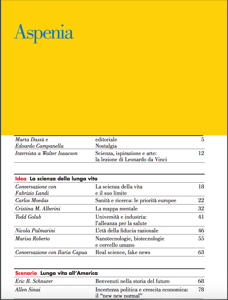 THE FORCE AWAKENS. The European elite has satisfied itself that this post-recession populist nationalism is receding. American liberals similarly console themselves with the belief that Trump cannot possibly win re-election with such abysmal approval ratings (they believe he only won to begin with because of our quirky electoral college system). But this is dubious: Trump’s base is unwavering in its support, while the demographics that most oppose him – the young and minorities – tend not to vote. And there’s an old saying in urban American politics, “You can’t beat someone with no one”; right now the opposition has no one. Not only is there no Democratic contender with the stature, gravitas, appeal and message necessary to improve upon Hillary Clinton’s electoral performance – there is no real Democratic raison d’etre.
THE FORCE AWAKENS. The European elite has satisfied itself that this post-recession populist nationalism is receding. American liberals similarly console themselves with the belief that Trump cannot possibly win re-election with such abysmal approval ratings (they believe he only won to begin with because of our quirky electoral college system). But this is dubious: Trump’s base is unwavering in its support, while the demographics that most oppose him – the young and minorities – tend not to vote. And there’s an old saying in urban American politics, “You can’t beat someone with no one”; right now the opposition has no one. Not only is there no Democratic contender with the stature, gravitas, appeal and message necessary to improve upon Hillary Clinton’s electoral performance – there is no real Democratic raison d’etre.
In part, that’s because the late-twentieth century progressive program has largely triumphed. Over the last decade, the economy has slowly transformed into one where “clean” cognitive-based industries have mostly banished “dirty” extractive industries and mechanically-oriented work; traditional gender roles and sexual norms have been overturned; formal apartheid has been crushed; liberal internationalism has been declared the only global social system; and traditional warfare (at least between developed countries) has been largely abandoned. It’s shocking to see all that suddenly falling apart at the very moment of its seemingly-unchallenged ascendancy – only if you don’t notice that that’s pretty much how history works. Liberalism is today’s spent force, while reaction is seemingly in the ascendance.
Nonetheless, the very developments driving this crisis pose serious long-term challenges to the alternatives to open, liberal, democratic societies, as well. The crisis of faith across the world is driven by emergent technologies and their attendant double-edged challenges. These will only accelerate in the next decade or two. Advances creating new industries and occupations that generate tremendous wealth for many will also render obsolete large swaths of professions beyond the blue-collar jobs that have so far borne the brunt of change. Capital and credit will become easier to obtain and new ventures easier to launch, while the gains from these will be increasingly concentrated in the hands of a limited few who own the algorithms that represent the new capital. The returns on other labor are likely to decline. Ubiquitous distributed technologies will make it easier for anti-liberal forces to penetrate and “hack” connected, open societies, transforming the nature and territory of conflict. At the same time, it will become easier for individuals to undermine oppressive, centralized systems and regimes and to form their own communities of choice.
THE FUTURE OF HISTORY. The ultimate resolution will likely produce new forms of government, economics and social organization as different from today’s as our world is from the Middle Ages. No one yet knows what these will look like. Hopefully – whether virtual or territorial – the cooperative will prevail over the extractive, the consensual over the coercive, and the connected over the chaotic.
What is certain, however, is that history is only just getting going again.
Writes & Wrongs

I wrote a few days ago that I’ve had an unusually fecund several weeks, churning out nine articles for four publications (plus the comments Tom Edsall quoted extensively in the New York Times), expanding my writing “footprint” to additional platforms to address increasing concerns about the direction we’re headed. I’d like to share with you what I’ve been writing lately – starting with my return this week to The Atlantic.
“It’s the Grandparents Stealing From the Grandchildren” – a title drawn from a conversation I actually once had with Kurt Vonnegut – addresses an issue I’ve been writing about since my “master’s thesis” at the Kennedy School: entitlements spending. The piece has harsh things to say about both parties’ approach – although it finds the Republicans most disingenuous (the piece reached #1 on The Atlantic within a few hours of its posting):
Speaker Paul Ryan announced that “we’re going to have to get back next year at entitlement reform, which is how you tackle the debt and the deficit,” even as he began negotiations with his Senate counterparts over exactly how much they’re gleefully going to increase the very same debt and deficit….
Which begs the question, why would we “reform” entitlements in a way that delays the changes until the problem they are supposedly intended to address will be largely history, imposing draconian cuts on the future? This amounts, purely and simply, to forcing our grandchildren both to pay for our profligacy today and our parsimoniousness tomorrow — or, if you prefer, our liberality toward ourselves and conservatism toward everyone else.
The other pieces published so far also have provoked strong disagreement across the political spectrum – which I hope means they’re making more of a contribution than usual.
For starters, in Why Donald Trump is the most successful president in nearly a century, I argued that, while “Trump is widely viewed as dangerously inept, disengaged, uninformed, uninterested in governing, devoid of meaningful policy objectives, and possibly unstable,” nonetheless “in a short period of time he has implemented more of his agenda, and more thoroughly remade American government and the country as a whole, than any president since Franklin Roosevelt.” To see my whole catalogue of reasons for this assertion, please read the article; yet, as I conclude, “None of this may be good. But it’s time to stop denying his success.”
Almost as if on cue, Trump and the Republicans achieved their greatest “success” to date in all-but-final enactment of their dream “tax cut” legislation. Test the Trickle Down Theory ridicules the economics behind the bill by asking whether any of its intended beneficiaries would be willing to take their cuts in IOU form: “If the GOP ‘supply-side’ theory is correct, those bonds ought to pay off bigly. If not, then they’ll be about as valuable as, say, a diploma from Trump University – but they also won’t then blow an additional $1.5 trillion hole in the national debt.”
A Hard Exit for the Rich puts aversion to taxes into the larger context of a radically changing world: “In coming years, technologies built on the internet, like the platform model and block chain (the technology underlying Bitcoin), will make it easier and easier for everyone – even the little people – to ‘secede and form a globally mobile republic, able to choose which jurisdiction they wish to operate under.’” And War on the Blue States is about more than what’s wrong with the tax bill. It’s about the widening gulf in America and, in particular, what I don’t think liberals heeded in 2016 and still aren’t heeding today:
Both sides of this increasingly-polarized divide see the other as trying to extirpate their way of life – and not inaccurately. Blue America spent the last eight years dictating both economic and cultural changes invalidating virtually every aspect of Red America. Liberals see all that as both righteous and benevolent – we’re both promoting better values and willing to help train them to be more like us. Yes, and that’s what the imperialists always say. Hence the Trump voters’ uprising. And now they’re getting back by imposing their values and destroying the arrogant elite’s culture and economy.
What that means for our politics – how liberalism needs to be modernized for a new era – is the theme of the first piece I wrote in November, The Constituencies of the 21st Century. It concludes, “New technologies are turning the global economy upside down, creating a stark worldwide division between winners and losers, and undermining the ability of the traditional nation-state to do anything about it…. These don’t demand that we move left or right. They demand that we move forward.”
As always, I welcome your comments.
Quick Links:
– Are Your Fingers in Your Ears?
– It’s the Grandparents Stealing From the Grandchildren
– Why Donald Trump is the most successful president in nearly a century
– War on the Blue States
– Test the Trickle Down Theory
– A Hard Exit for the Rich
– The Constituencies of the 21st Century
Are Your Fingers in Your Ears?

It’s been an unusually busy several weeks, so it’s been unusually long since I provided an update. October was consumed, of course, with the Greater Good conference I organized – I’ll have more on that in a future update, but if you just can’t wait you can watch a video of my speech summarizing the conference here. And I spent half of November traveling in Arizona, where we’re working on strengthening the Hopi school system, and in Kentucky, working on rural economic development (and meeting several Derby-winning horses). In between, I managed to crank out four articles for US News & World Report, two for Aspenia (one of which is forthcoming this month), and three more for The Atlantic now in the queue for publication.
So, there’s a lot for future updates!
But I’m writing today to share with you a column by the great Thomas Edsall in this morning’s New York Times, “Liberals Need to Take Their Fingers Out of Their Ears,” in which he refers to a piece I wrote last week in US News and then quotes extensively from an exchange he and I had over the weekend. I’ll just let Edsall do the talking – and the quoting – from here on:
I am quoting [Karen] Stenner [author of “The Authoritarian Dynamic”] — and later in this column, the public policy analyst Eric Schnurer — at length because they both make arguments about complex ideas with precision and care….
Eric Schnurer, a writer and public sector management consultant who has worked for many Democratic politicians and presidential candidates, addresses what he sees as the lack of recognition on the part of liberals of what motivates conservative voters.
“Both sides of this increasingly polarized divide see the other as trying to extirpate their way of life — and not inaccurately,” Schnurer wrote in “War on the Blue States” in U.S. News and World Report earlier this month:
Blue America spent the last eight years dictating both economic and cultural changes invalidating virtually every aspect of Red America. Liberals see all that as both righteous and benevolent — we’re both promoting better values and willing to help train them to be more like us.
Schnurer elaborated on this line of thought in an email:
The prototypical Trump voter sees a changing America leaving him behind; part of this is economic, part of it demographic, part cultural. I think liberals tend to see this as a thin cover for racism, a reflection of troglodyte viewpoints, and in any event unwarranted as the world these folks are resisting would be better even for them if only they’d let it, by giving up their benighted religious views, accepting job training in the new technologies, and preferably moving to one or the other coasts or at least the closest major city.
Red and blue America often draw diametrically opposed conclusions from the same experiences and developments, Schnurer contends:
I don’t think there’s much argument that the modern economy is killing off small towns, US-based manufacturing, the interior of the US generally, etc. There is, or could be, an argument as to whether that’s just the necessary functioning of larger economic forces, or whether there are political choices that have produced, or at least aided and abetted, those outcomes. In any event, while most of us in Blue World see these changes as beneficent, they have had devastating effects on the economies of “red” communities.
Schnurer observes that
This is a classic political problem of general benefit at the cost of specific individual harm. At a minimum, “we” — as a country but also as a self-styled progressive subset of that country — have given inadequate thought to those harms and how to ameliorate them; but I think you can also make the argument that we have exacerbated them.
Long-term trends may be working in favor of the left, as the recent governor’s races in Virginia and New Jersey suggest, but liberals, Schnurer argues, are using policy to accelerate the process without determining the costs:
For example, we could adopt protectionist policies, which of course we haven’t because both mainstream Democrats and Republicans see them as counterproductive in the long term; but we have also attempted more actively to steer the economy more quickly to the likely, proper, outcome by shifting national tax and spending priorities toward new energy technologies, and away from fossil fuels.
Schnurer notes that
You don’t have to buy the right’s “war on coal” rhetoric to accept that, even if that’s the direction the world is headed, anyway, hastening coal’s demise and shifting federal subsidy policy away from it and into alternative energy sources will have a negative economic effect on certain communities.
In addition to the economic setbacks experienced in heavily Republican regions of the country, Schnurer, himself a liberal, argues that blue America has over the last decade declared war on the “red way of life.”
He makes a case very similar to Stenner’s:
The political, economic, and cultural triumph nationwide of a set of principles and realities essentially alien to large numbers of Americans is viewed as (a) being imposed upon them, and (b) overturning much of what they take for granted in their lives — and I don’t think they’re wrong about that. I think they’ve risen in angry revolt, and now intend to give back to the “elite” in the same terms that they’ve been given to. I don’t think this is good — in fact, I think it’s a very dangerous situation — but I think we need to understand it in order to responsibly address it.
Do liberals in fact need to understand — or empathize with — their many antagonists, the men and women who are sharply critical of the liberal project?
Please read Edsall’s full piece in today’s Times. And I’ll have more soon on what I wanted to share with you from my other writing. Until then – as always – I welcome your comments.
Quick Links:
– Tom Edsall’s colum: Liberals Need to Take Their Fingers Out of Their Ears
– My US News piece: War on the Blue States
– Greater Good Gathering website
Death and Life
 This past weekend was the first Greater Good Gathering – something I hope will become not just an annual event but part of a larger initiative to promote the “greater good” globally. What does this mean? I’ll be discussing that in more detail in several articles and in a future update – but you can already read this coverage of the conference:
This past weekend was the first Greater Good Gathering – something I hope will become not just an annual event but part of a larger initiative to promote the “greater good” globally. What does this mean? I’ll be discussing that in more detail in several articles and in a future update – but you can already read this coverage of the conference:
Greater Good Conference Holds Inaugural Gathering
A Gathering Seeks Levers to Rebuild Common Good
In my own remarks at the conference, I defined my view of “the greater good” as something not partisan or ideological, but rather simply “advancing the good of others than just yourself.” Below is one of the “graphic illustrations” from the conference, summarizing my remarks.
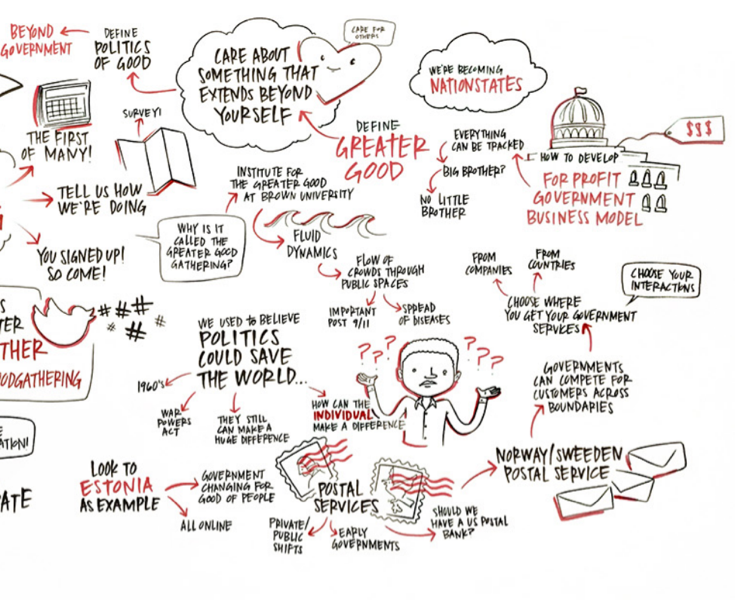 A similar theme was struck by our keynote speaker, Martin Luther King III:
A similar theme was struck by our keynote speaker, Martin Luther King III:
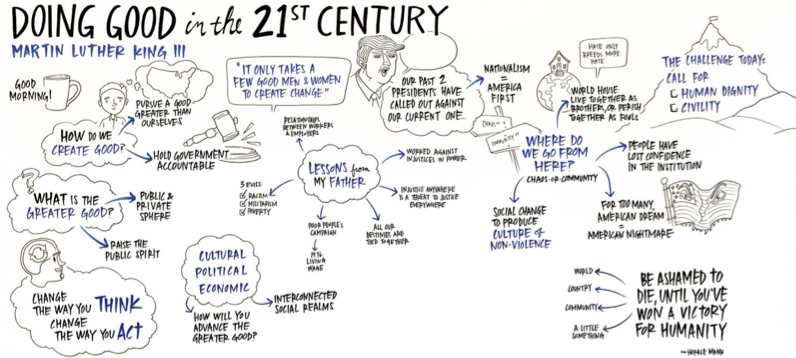
As I discussed in my piece this week for US News & World Report, Live More Life, “For me, this has always been the basis for a particular concern with justice and fairness.” The article relates these “macro” issues to more personal concerns that start from my learning during the conference that one of our cats was dying. “I’ve come to see these passings as less about the awesome finality of death than the wonder of life,” I wrote, which takes us to the heart of this week’s missive:
[W]e can and must make the most of the time we have. The literary critic Harold Bloom, in his interpretation of “The Book of J,” one of the main source documents of what we now know as the Hebrew Bible, focuses on the image of King David.… Despite (if not, indeed, because of) his all-too-human failings – his passion not just for God, but also for conquest, for women, for all around him – David personified an ethos of “more life” that Bloom explicates from all the “J” text as God’s central aim. That doesn’t necessarily mean more years, but it does mean that the purpose of life is to wring as much from those years as possible.
But living life fully cannot possibly mean living life selfishly: To confine one’s concerns to one’s self is to limit oneself even more in time and space than the constraints nature already imposes on us. Why would one do that? In fact, my greatest concern for our country in this time of Donald Trump is not the repugnance that flows from Trump himself, but rather that a near-majority of Americans would embrace an ethos that concerns itself with nothing but the self….
People often shrug at injustice with the words, “Life isn’t fair.” Well, no, it isn’t. But while life itself places conditions upon us, our unique intelligence and moral sense give us the ability to transcend those constraints, to make life, and the world around us, more fair. To do so – not just for ourselves, but even more so for others – is how we, too, pursue “more life.” We ought all weep those times we cannot.
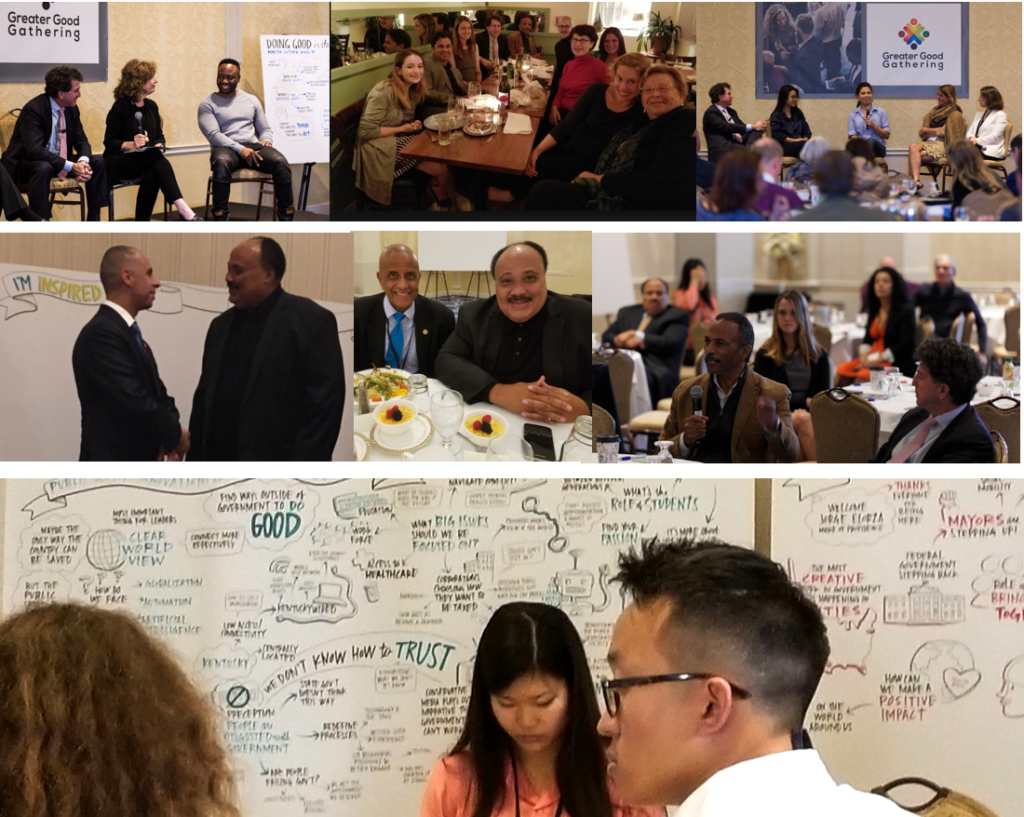
This piece was, in many ways, an unintended bookend to my reaction to the Las Vegas shootings that appeared two weeks ago. As I noted at the very beginning of Change Our Violent Culture, “Las Vegas made one thing clear: No matter the size of the massacre, nothing will lead to gun control legislation in this country.” But, I continued, “frankly, I don’t think we have a violent society because guns are readily available: Rather, guns are readily available because we are a violent society. That’s what really needs to change.” After a discussion of the constitutional and practical impediments to stricter gun laws, I turned to my central argument:
[U]ltimately, combating antisocial behavior, whether words or weapons, is, as conservatives like to assert, a matter of culture more than law…. This goes for everyone: If you’re stockpiling death-dealing weaponry, you’re part of the problem, not the solution. But if you patronize violent movies, buy products that advertise on violent TV shows, let your kids play violent video games, honor singers of violent lyrics, or vote for politicians who cynically promote firearms in bars and schools while banning them (for obvious reasons) from the government buildings where they work, then you’re part of the problem, too.
Because a nation that acted like shooting people is wrong, every day, wouldn’t also experience a mass shooting virtually every day.
I’m heartened that surprisingly large numbers of people seem to see the Greater Good initiative as a ray of hope in an otherwise dark time. Because, as always, where there’s life, there’s hope.
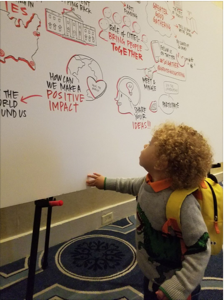
As usual, I welcome your comments below!
Sign up HERE to get my blogs directly to your inbox! Get the latest news and analysis of current events and public policy.
Of Good … and Evil
It was an unusually busy August! I’d like to update you on a few goings-on – most importantly, the Greater Good Gathering that I described in my last update. This is the first annual “Greater Good” conference, Democracy, Citizenship, and the Greater Good: Charting a Path in Changing Times, part of a larger, long-term effort aimed at the future.
The Gathering is now set for October 20-22 (Friday evening through Sunday lunchtime) in Providence, Rhode Island. We are in the process of finalizing the program, with a fantastic lineup of speakers already confirmed, and other panelists we are waiting to confirm. Most importantly, the Greater Good Gathering official website is now live, where you can stay up-to-date on the program, register and book your hotel rooms at the historic Biltmore Hotel, Providence, Rhode Island, where the Gathering will be held.
As you’ll see, confirmed speakers already include a former governor, a law professor on cybersecurity advising the World Intellectual Property Organization, a nationally-recognized communications expert, award-winning advocates for their work addressing human trafficking, the CEO of a major health care reform organization, the author of the nation’s first “Medicaid-For-All” legislation, the first woman and youngest person ever to lead a major AFL-CIO labor federation, one of Foreign Policy Magazine’s Top 100 Global Thinkers, and the co-founder of the Boston Mayor’s Office of New Urban Mechanics – among others.
We’ll be discussing:
-Public Sector Innovation: Can Government Be Saved?
-Defending Democracy & The Future of the Public Good
-Technology and Power: A History of the Future
-Up and Coming Innovators
-Public Good Beyond the Public Sector
-Application & Illustration: Health Care
There will also be plenty of time for networking and mentoring. Conference registration includes a welcome dinner, and healthy full breakfasts and lunches, at the Biltmore Hotel. Space is limited, so please register today.
Meanwhile, in the last month, our country has been fraying in ways unseen since the civil rights and Vietnam War era. As I wrote a few weeks ago in Government Untethered: “Some people find frightening the notion that countries as we know them – including our own – are on the verge of splitting apart. Others find it crazy. Scrolling through my news feed on a single, representative day last week … I found it simply to be the new normal.” Concluding with the story of the Venezuelan opposition’s attempts to create essentially a parallel, virtual democracy in the face of an increasingly-authoritarian government, I asked whether, in the long term,
a government, and its army, [can] hold territory where it has lost large swaths of the population? As people increasingly find the means to unite and construct self-governing mechanisms outside of “government,” can they actually opt-out of governments that don’t represent them? That’s a proposition that Venezuelans will be testing in coming weeks…. This isn’t just esoteric futurism anymore: It’s the daily news.
But, despite the new-technology veneer, all of this has roots that go back to the very beginnings of human civilization. In The Age-Old Rural Conflict, I wrote about the famous story of Cain and Abel as allegory for the triumph of settled agriculture – the New Economy of its day – over pastoralism. Cain is then portrayed in the Bible as, not coincidentally, moving on from murdering his herdsman brother to founding a major city.
The Cain and Abel story reflects a particular incident – the transition to settled agriculture and, as a result, urbanism – in the long history of technological change killing off prior economic, and attendant cultural and religious, arrangements. Such transitions aren’t peaceful, and they haven’t ended. The resulting sense of threat and hostility can reach Biblical proportions.
I’m thinking about both Good and Evil more right now, as I’ll be teaching a new course about them – called “Deep Policy” – this winter at Union Theological Seminary. Instead of talking about what policies might best address the challenges we face in such areas as crime control, inequality, discrimination, repression, environmental destruction, or a host of others, the course will ask, What drives these challenges to begin with and what – if anything – can we do to prevent them? To do this, we will draw upon and attempt to synthesize a wide range of disciplines, from theology and philosophy to chaos and game theory, ethics to evolutionary biology, psychology to economics – and, of course, public policy. In short, we will take an interdisciplinary approach to how wrong occurs – and how to right it.
I’ll have more on these subjects – and a few other upcoming conferences I’m organizing – in future updates.
As always, I look forward to hearing from you in the comments below.
Quick Links:


